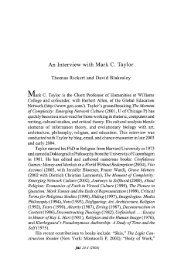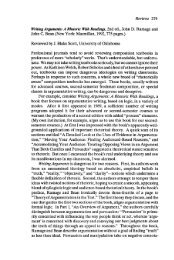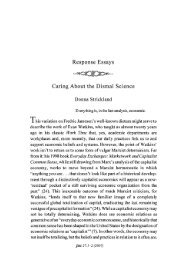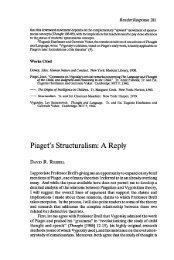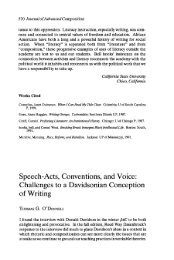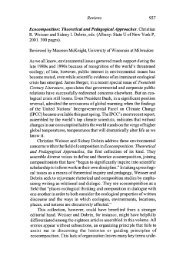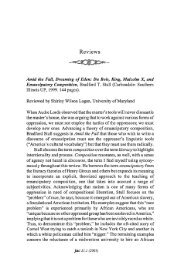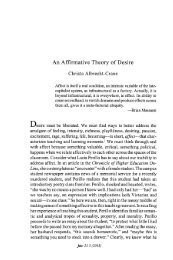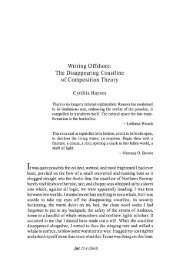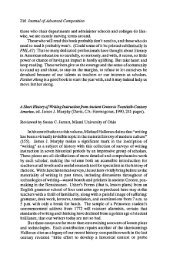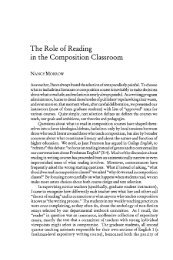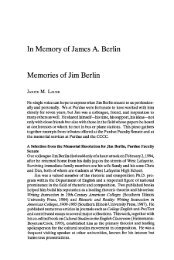Politics, Pedagogy, and the Profession of Composition ... - JAC Online
Politics, Pedagogy, and the Profession of Composition ... - JAC Online
Politics, Pedagogy, and the Profession of Composition ... - JAC Online
You also want an ePaper? Increase the reach of your titles
YUMPU automatically turns print PDFs into web optimized ePapers that Google loves.
Bruce Horner 135<br />
experience, <strong>and</strong> when <strong>and</strong> how to exercise what sort <strong>of</strong> power to help move<br />
<strong>the</strong> students as a whole toward <strong>the</strong> project <strong>of</strong> <strong>the</strong> course.<br />
For example, Ellsworth <strong>and</strong> her students might have negotiated where<br />
<strong>and</strong> how <strong>the</strong>y, in all <strong>the</strong>ir partialities, would direct all <strong>the</strong>ir materiallylimited<br />
energies to investigate <strong>and</strong> counter racist structures <strong>and</strong> practices<br />
at <strong>the</strong> University <strong>of</strong> Wisconsin, Madison (<strong>the</strong> initial topic <strong>of</strong> <strong>and</strong> impetus<br />
for <strong>the</strong> course, after all). They might have used what expertise, authority,<br />
<strong>and</strong> resources <strong>the</strong>y possessed to work toward such ends ra<strong>the</strong>r than<br />
attempting <strong>the</strong> inevitably doomed project <strong>of</strong> achieving a critical utopia in<br />
classroom relations. Indeed, it appears that <strong>the</strong> students <strong>the</strong>mselves came<br />
to ab<strong>and</strong>on Ellsworth's commitment to achieving an ideal classroom<br />
environment when <strong>the</strong>y transformed <strong>the</strong> course into what <strong>the</strong>y termed<br />
"Coalition 607" (317). That is, ra<strong>the</strong>r than imagining <strong>the</strong> work <strong>of</strong> <strong>the</strong><br />
course outside material exigencies, <strong>the</strong>y relocated it within a particular<br />
time <strong>and</strong> place, reoriented <strong>the</strong>ir efforts toward achieving more reachable<br />
goals, <strong>and</strong> treated <strong>the</strong>ir contradictions <strong>and</strong> partialities in relation to those<br />
exigencies ra<strong>the</strong>r than letting <strong>the</strong>m serve as obstacles to <strong>the</strong>ir work.<br />
That <strong>the</strong>y were successful in doing so demonstrates <strong>the</strong> need to couple<br />
attention to differences within <strong>and</strong> among students in a course over time<br />
with attention to differences between <strong>the</strong> students within a course <strong>and</strong><br />
students <strong>and</strong> o<strong>the</strong>rs outside <strong>the</strong> course. Ellsworth is attentive to <strong>the</strong><br />
differences among her students, but she says little about <strong>the</strong> relation <strong>of</strong><br />
those students to o<strong>the</strong>r students, to <strong>the</strong>ir institutional position vis-a-vis<br />
those o<strong>the</strong>r students, <strong>the</strong> university, herself, <strong>and</strong> <strong>the</strong> course-all <strong>of</strong> which<br />
might provide a useful perspective <strong>and</strong> context from which to underst<strong>and</strong><br />
<strong>the</strong> difficulties <strong>and</strong> successes that she <strong>and</strong> <strong>the</strong>y experienced. Gore, noting<br />
that many accounts <strong>of</strong>feminist <strong>and</strong> critical pedagogies "pay little attention<br />
to <strong>the</strong> location <strong>of</strong><strong>the</strong>ir practices in educational institutions," argues that<br />
we need to define <strong>the</strong> contexts for such pedagogical work "historically<br />
<strong>and</strong> politically" while acknowledging "<strong>the</strong> unique struggles that characterize<br />
<strong>the</strong> exercise <strong>of</strong> power at <strong>the</strong> micro levels" (61). O<strong>the</strong>rwise, <strong>the</strong><br />
problem <strong>of</strong> "empowerment" remains trapped in <strong>the</strong> dualisms <strong>of</strong> power/<br />
powerlessness <strong>and</strong> domination/subordination, understood as "purely<br />
oppositional stances" ra<strong>the</strong>r than as a problem <strong>of</strong> "multiplicity <strong>and</strong><br />
contradiction." In <strong>the</strong> case <strong>of</strong> Ellsworth 's course, differentiating between<br />
her students <strong>and</strong> o<strong>the</strong>rs by attending to <strong>the</strong> fact that <strong>the</strong> course was a<br />
"special topics" graduate education course ra<strong>the</strong>r than, say, a required<br />
first-year writing course would surely be significant to any underst<strong>and</strong>ing<br />
<strong>of</strong> <strong>the</strong> work <strong>of</strong> that course. By contrast, her failure to investigate <strong>the</strong><br />
implications <strong>of</strong> <strong>the</strong> specific institutional, curricular location <strong>of</strong> <strong>the</strong> course



